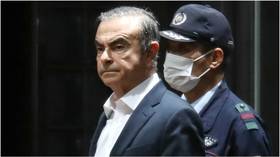Japan to ‘tighten’ departure rules after embattled Nissan’s ex-chief Carlos Ghosn flees

The Japanese justice minister promised to beef up departure controls after former auto titan Carlos Ghosn pulled off a daring escape from Japan, where he is charged with financial misconduct.
A frustrated Masako Mori announced on Sunday that she had instructed the nation’s immigration services “to coordinate with related agencies to further tighten departure procedures.”
“It is clear that we do not have records of the defendant Ghosn departing Japan,” Mori said, stressing that the former chairman and CEO of the Renault-Nissan-Mitsubishi Alliance jumped bail and traveled from the airport in Osaka to Beirut, Lebanon by using “some wrongful methods.”
Mori also confirmed that Ghosn’s bail had been revoked, after which Interpol had issued a non-binding ‘wanted’ notice to detain the fugitive on Tokyo’s request.
In Japan, Ghosn is charged with embezzlement and lying about the size of his salary to shareholders. He was arrested and sacked from his positions, then released on bail and placed under house arrest. He fled Japan on December 29 and reached Beirut via Istanbul the next day.
Also on rt.com Pilots detained as Turkey opens probe on ex-Nissan chief Ghosn's Japan escape via Istanbul – reportsMany details of the businessman’s daring escape remain unclear. There were reports that he managed to ditch surveillance by being smuggled out in a large box for musical instruments. However, investigative sources later told Japanese public broadcaster NHK that surveillance footage had actually shown Ghosn leaving his Tokyo home and never returning.
Furthermore, citing sources, Sankei newspaper reported on Saturday that the ex-CEO fled on the day when a private security company, hired by Nissan, stopped monitoring Ghosn because his lawyers threatened the firm with a lawsuit. Japanese media also reported that the escape was aided by a former Green Beret with experience in extracting hostages. The businessman, who is a Brazilian, French and Lebanese national, reportedly left on a private jet using his spare French passport.
Ghosn, who denies the allegations against him, explained that he chose to flee Japan because he does not trust the “rigged” local justice system. Although shocked by Ghosn’s escape, his chief lawyer, Takashi Takano, said the authorities violated his client’s right to see his wife, and that Ghosn was worried about not getting a fair trial due to the prosecutors’ leaks to the media and had feared that the legal process may take years.
Lebanon does not have an extradition treaty with Japan. Lebanese caretaker Justice Minister Albert Serhan told the Mainichi Shimbun newspaper that the country has no plans to hand over Ghosn, despite having received a notice from Interpol asking them to detain him.
The Tokyo District Public Prosecutor’s Office, meanwhile, stated on Sunday that the ex-CEO “knowingly flouted” Japan’s judicial procedures, while his “abundant financial power and multiple foreign bases” made it easy for him to flee the country. The prosecutors maintain that Ghosn must be detained to order to ensure “fair and appropriate criminal proceedings,” and there is a “realistic danger” of him destroying evidence in the case.
Think your friends would be interested? Share this story!












